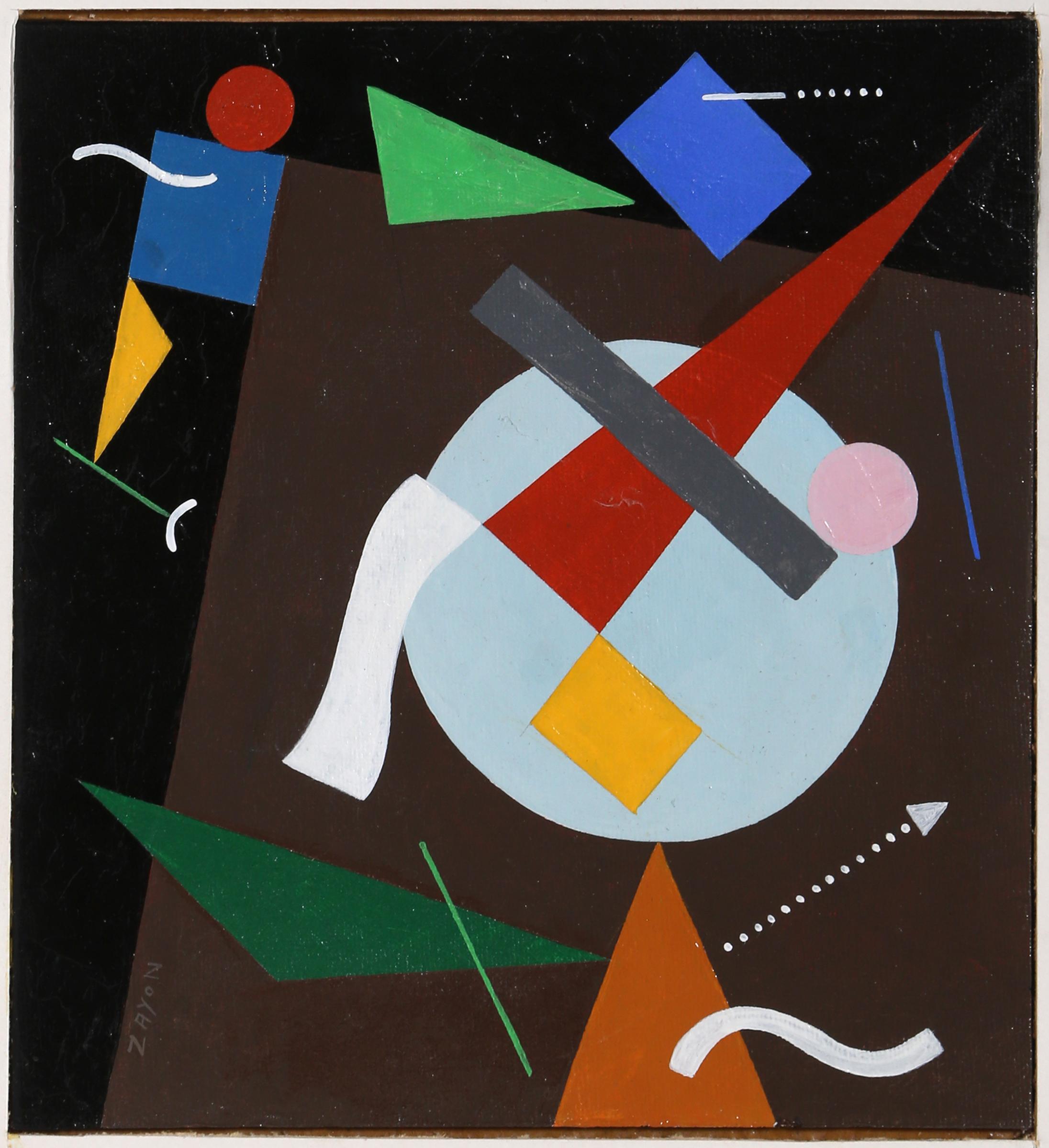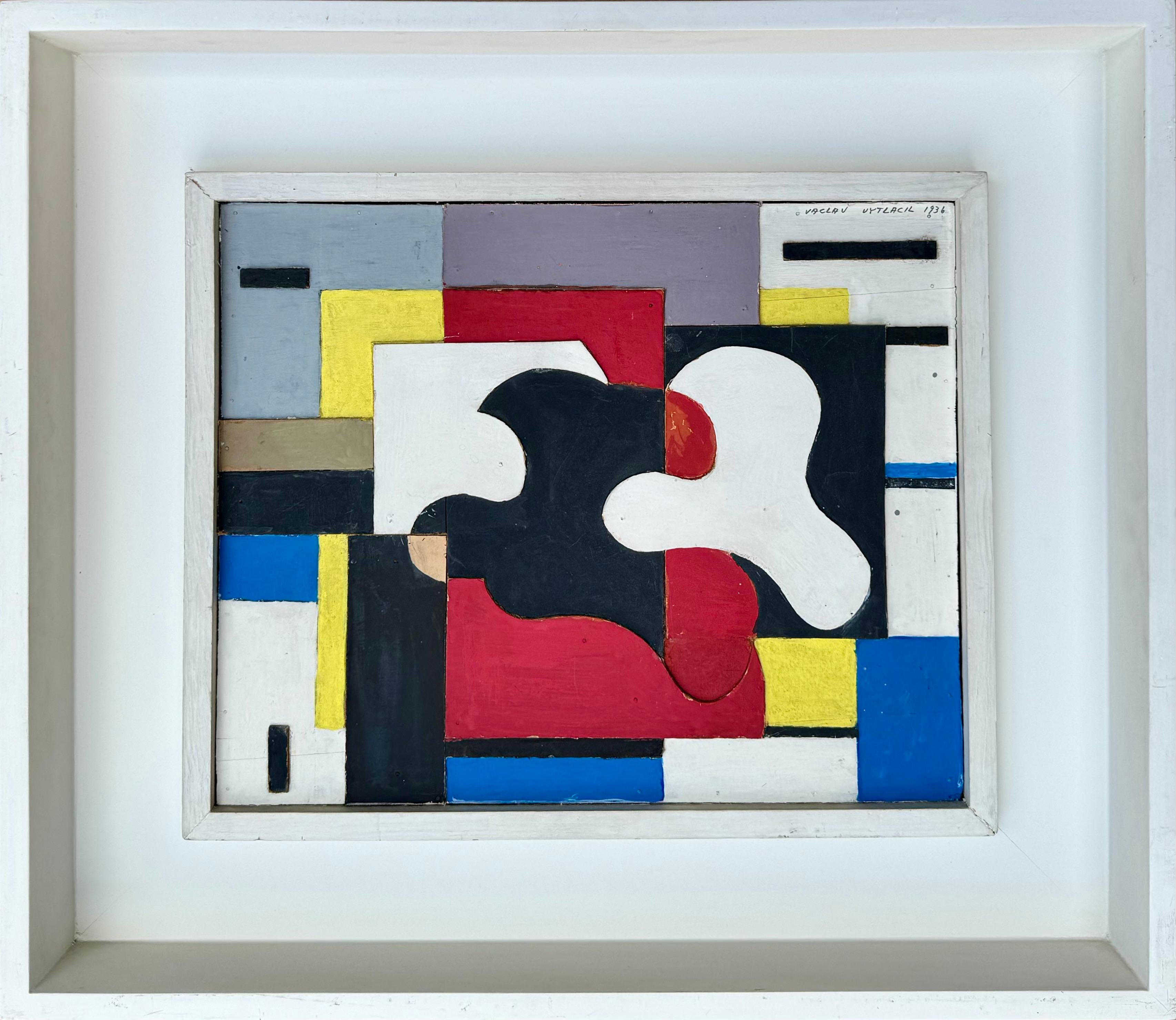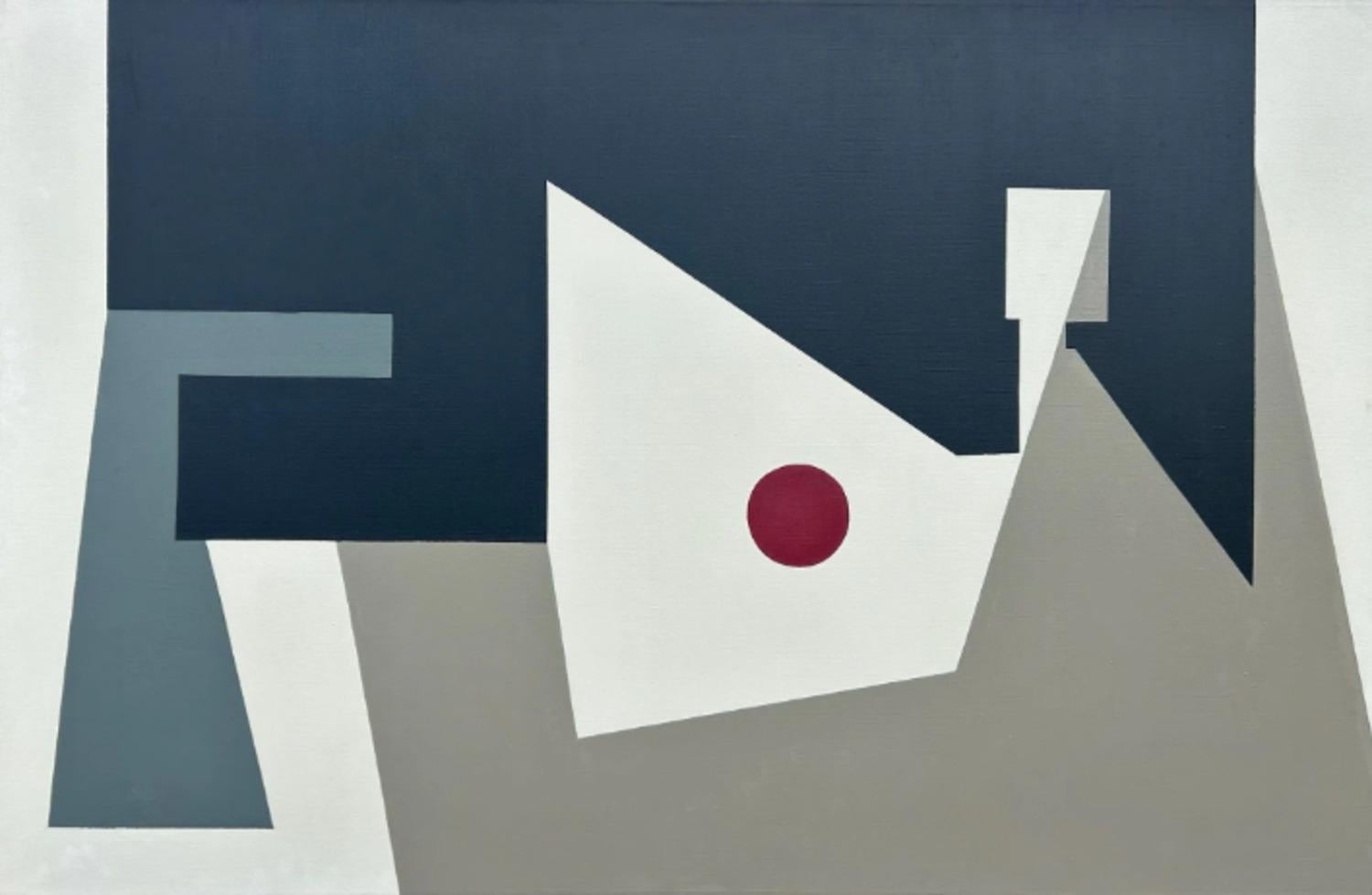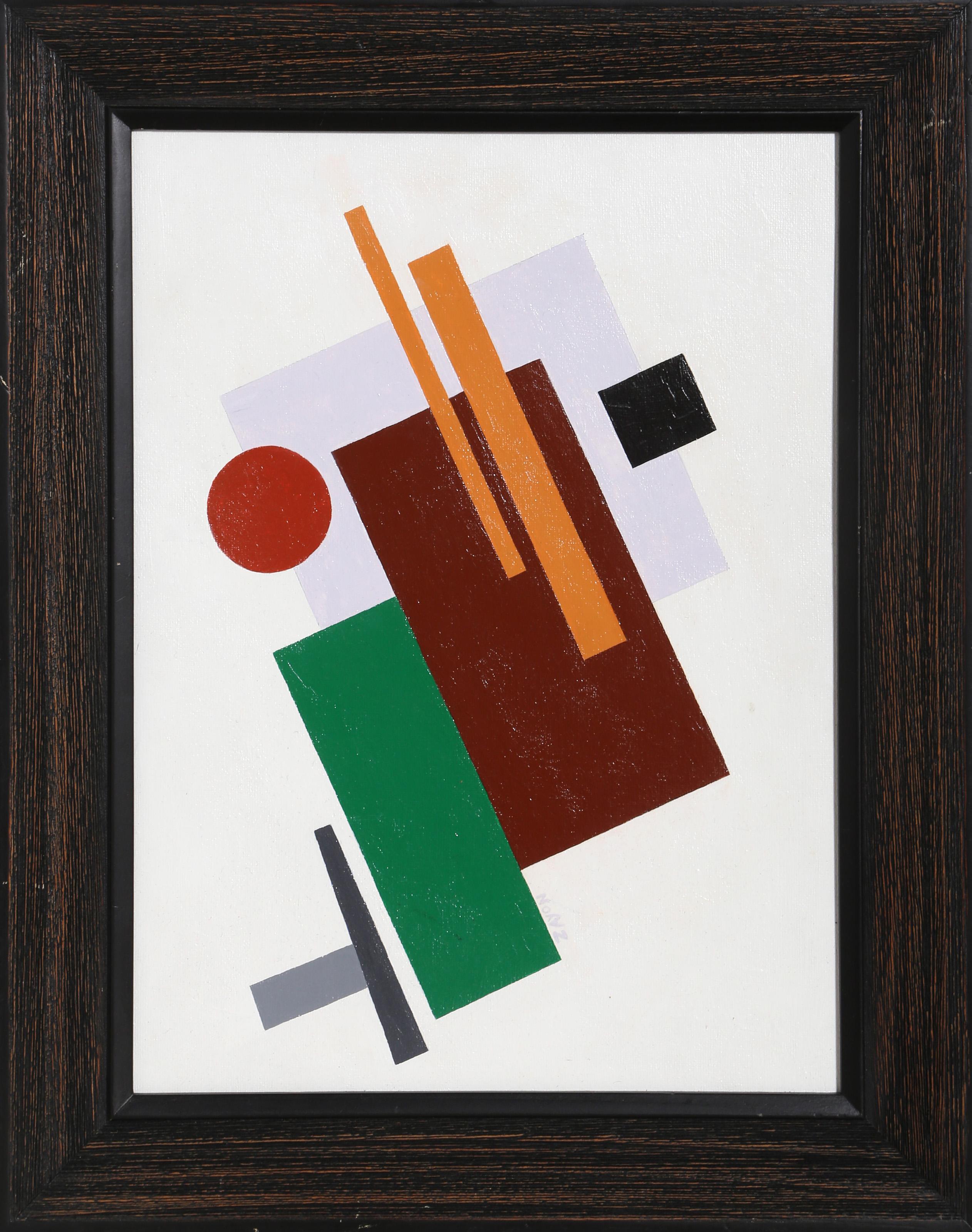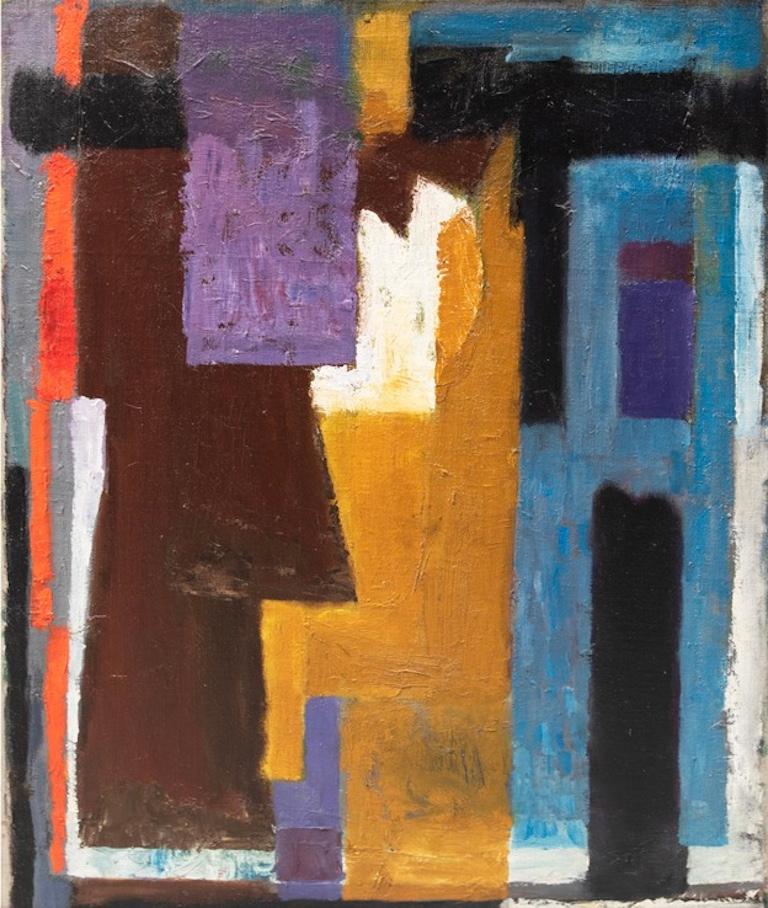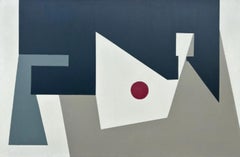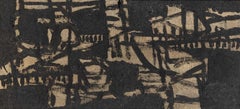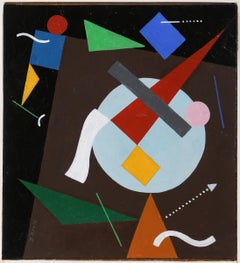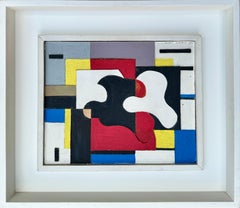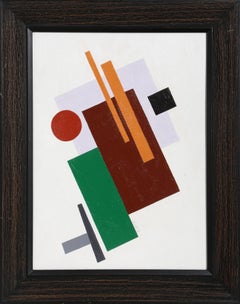Items Similar to "Untitled, " Seymour Fogel, Geometric Abstraction, Texas Hard-Edge
Want more images or videos?
Request additional images or videos from the seller
1 of 6
Seymour Fogel"Untitled, " Seymour Fogel, Geometric Abstraction, Texas Hard-Edge
$4,600
$5,75020% Off
£3,508.21
£4,385.2620% Off
€4,042.37
€5,052.9620% Off
CA$6,570.98
CA$8,213.7320% Off
A$7,224.05
A$9,030.0620% Off
CHF 3,734.22
CHF 4,667.7820% Off
MX$86,440.33
MX$108,050.4120% Off
NOK 47,143.71
NOK 58,929.6420% Off
SEK 44,198.55
SEK 55,248.1820% Off
DKK 30,190.67
DKK 37,738.3420% Off
About the Item
Seymour Fogel
Untitled
Oil on illustration board construction
10 x 7 1/2 inches
Provenance:
Estate of the artist
Charles and Faith McCracken
Larry and Trish Heichel
Private Collection
Seymour Fogel was born in New York City on August 24, 1911. He studied at the Art Students League and at the National Academy of Design under George Bridgeman and Leon Kroll. When his formal studies were concluded in the early 1930s he served as an assistant to Diego Rivera who was then at work on his controversial Rockefeller Center mural. It was from Rivera that he learned the art of mural painting.
Fogel was awarded several mural commissions during the 1930s by both the Works Progress Administration (WPA) and the Treasury Section of Fine Arts, among them his earliest murals at the Abraham Lincoln High School in Brooklyn, New York in 1936, a mural in the WPA Building at the 1939-1940 New York World's Fair, a highly controversial mural at the U.S. Post Office in Safford, Arizona (due to his focus on Apache culture) in 1941 and two murals in what was then the Social Security Building in Washington, D.C., also in 1941. Fogel's artistic circle at this time included Phillip Guston, Ben Shahn, Franz Kline, Rockwell Kent and Willem de Kooning.
In 1946 Fogel accepted a teaching position at the University of Texas at Austin and became one of the founding artists of the Texas Modernist Movement. At this time he began to devote himself solely to abstract, non-representational art and executed what many consider to be the very first abstract mural in the State of Texas at the American National Bank in Austin in 1953. He pioneered the use of Ethyl Silicate as a mural medium. Other murals and public works of art done during this time (the late 1940s and 1950s) include the Baptist Student Center at the University of Texas (1949), the Petroleum Club in Houston (1951) and the First Christian Church, also in Houston (1956), whose innovative use of stained glass panels incorporated into the mural won Fogel a Silver Medal from the Architectural League of New York in 1958.
Fogel relocated to the Connecticut-New York area in 1959. He continued the Abstract Expressionism he had begun exploring in Texas, and began experimenting with various texturing media for his paintings, the most enduring of which was sand. In 1966 he was awarded a mural at the U.S. Federal Building in Fort Worth, Texas. The work, entitled "The Challenge of Space", was a milestone in his artistic career and ushered in what has been termed the Transcendental/Atavistic period of his art, a style he pursued up to his death in 1984. Painted and raw wood sculpture was also reflective of this style. Another mural done during this period was the U.S. Customs Building at Foley Square in New York City that was entirely executed in mosaic tiles, a mural medium he preferred in the last decades of his career.
Fogel's work is well represented in the collections of major museums, among them the Metropolitan Museum of Art and the Whitney Museum of American Art in New York City, the Dallas Museum of Fine Art in Texas, the National Portrait Gallery and the Hirshhorn Museum and Sculpture Garden in Washington, D.C., The State Museum of Louisiana in New Orleans, and the Telfair Museum in Savannah, Georgia.
During his life Fogel authored numerous articles on the interrelationship of art and architecture, served as a Vice President of the Architectural League of New York (1960) and has had his work imaged and/or discussed in some thirty books, including Nathanial Pousette-Dart's seminal work "American Painting Today" (1956) where Fogel was included along with the likes of Milton Avery, Robert Motherwell, Jackson Pollock, Edward Hopper, Yasuo Kuniyoshi and Stuart Davis as important American artists.
- Creator:Seymour Fogel (1911-1984, American)
- Dimensions:Height: 16 in (40.64 cm)Width: 13.5 in (34.29 cm)
- Medium:
- Movement & Style:
- Period:
- Condition:
- Gallery Location:New York, NY
- Reference Number:1stDibs: LU1841211695132
About the Seller
5.0
Platinum Seller
Premium sellers with a 4.7+ rating and 24-hour response times
Established in 2022
1stDibs seller since 2022
126 sales on 1stDibs
Typical response time: <1 hour
- ShippingRetrieving quote...Shipping from: New York, NY
- Return Policy
Authenticity Guarantee
In the unlikely event there’s an issue with an item’s authenticity, contact us within 1 year for a full refund. DetailsMoney-Back Guarantee
If your item is not as described, is damaged in transit, or does not arrive, contact us within 7 days for a full refund. Details24-Hour Cancellation
You have a 24-hour grace period in which to reconsider your purchase, with no questions asked.Vetted Professional Sellers
Our world-class sellers must adhere to strict standards for service and quality, maintaining the integrity of our listings.Price-Match Guarantee
If you find that a seller listed the same item for a lower price elsewhere, we’ll match it.Trusted Global Delivery
Our best-in-class carrier network provides specialized shipping options worldwide, including custom delivery.More From This Seller
View All"Composition" Balcomb Greene, Geometric Abstract, Early Modernist Composition
By Balcomb Greene
Located in New York, NY
Balcomb Greene
Composition, 1936
Signed Balcomb Greene on verso upper stretcher bar
Signed on backing board: Balcomb Greene
Oil on canvas
30 1/4 x 46 inches
Provenance:
The artist
A...
Category
1930s Abstract Abstract Paintings
Materials
Canvas, Oil
"Ouverture, with Cypress Forms" Stephen Edlich, Abstract Geometric Painting
By Stephen Edlich
Located in New York, NY
Stephen Edlich
Ouverture, with Cypress Forms, 1982
Signed, dated and titled on the stretcher
Acrylic paint, mixed media, and burlap on canvas
60 x 40 inches
An artist who worked in the post-cubist and constructivist traditions, Stephen P. Edlich gained a considerable amount of acclaim in the 1970s and 1980s for his collages, sculpture, and paintings. His promising career was cut short due to his untimely death at age 45 in 1989.
Edlich was born in New York City. He received his undergraduate degree with a major in fine arts studies from New York University in 1967. During his college years, he traveled to London, where he met the art dealer Victor Waddington and created his first white on white collage. In that same year, he attended a major exhibition of the work of Ben Nicholson, which would be influential source in his art. Edlich returned to England in 1967, where he met Barbara Hepworth and Patrick Heron in London and traveled to St. Ives, Cornwall, long a favorite artists' haunt. Edlich began creating acrylic reliefs...
Category
1980s Abstract Geometric Abstract Paintings
Materials
Canvas, Burlap, Mixed Media, Acrylic
$60,000 Sale Price
20% Off
"Abstract Interior of Room" Myron Lechay, Colorful Early Geometric Abstract
By Myron Lechay
Located in New York, NY
Myron Lechay
Abstract Interior of Room, 1923
Signed upper right corner and dated upper left corner
Oil on canvas
24 x 20 inches
Provenance:
Estate of the artist
Spanierman Gallery, ...
Category
1920s Abstract Abstract Paintings
Materials
Canvas, Oil
"Untitled" Roy Newell, Mid-Century, Black Abstract Expressionist Composition
Located in New York, NY
Roy Newell
Untitled, 1953
Signed and dated Roy Newell-1953
Oil on board
3 1/4 x 7 1/4 inches
Provenance
The Collection of Dr. and Mrs. Maximilian Le Witter
Estate of the above
Roy...
Category
1950s Abstract Expressionist Abstract Paintings
Materials
Oil, Board
"Untitled" Calvert Coggeshall, Abstract Expressionism Hard-edge Stripes
Located in New York, NY
Calvert Coggeshall
Untitled, circa 1975
Oil on canvas
50 x 40 inches
Calvert Coggeshall worked as an abstract painter and interior designer primari...
Category
1970s Abstract Expressionist Abstract Paintings
Materials
Canvas, Acrylic
"Untitled" Albert Heckman, Mid-Century American Modernist Abstract Composition
By Albert Heckman
Located in New York, NY
Albert Heckman
Untitled
Signed lower left
Oil on canvas
20 x 24 inches
Albert Heckman was born in Meadville, Western Pennsylvania, 1893. He went to New York City to try his hand at...
Category
1950s Modern Abstract Paintings
Materials
Canvas, Oil
You May Also Like
Geometric Space Abstract (After Kandinsky), Oil Painting by Seymour Zayon
Located in Long Island City, NY
Artist: Semour Zayon American (1930 - )
Title: after Kandinsky
Medium: Oil on Canvas Board, signed l.l.
Size: 20 x 16 inches
Frame: 23.5 x 19.5 inches
Category
Late 20th Century Suprematist Abstract Paintings
Materials
Oil
Construction Composition, Geometric Abstract Oil Painting by Seymour Zayon
Located in Long Island City, NY
Artist: Semour Zayon American (1930 - )
Title: Construction Composition (After Kandinsky)
Medium: Oil on Board, signed
Size: 10 x 9.5 inches
Frame: 14 x 11.25 inches
Category
Mid-20th Century Abstract Geometric Abstract Paintings
Materials
Oil
Abstract Cubist Construction Collage Mid 20th Century American Modernism Cubism
By Vaclav Vytlacil
Located in New York, NY
Abstract Cubist Construction Collage Mid 20th Century American Modernism Cubism
Vaclav Vytacil (1892 - 1984)
Abstract Construction #2
Caesin on board collage
11 x 13 1/2 th inches
S...
Category
1930s Abstract Abstract Paintings
Materials
Casein, Board
Geometric Abstract on White, Abstract Geometric Oil Painting by Seymour Zayon
By Seymour Zayon
Located in Long Island City, NY
Seymour Zayon, American (1930 - ) - Geometric Abstract on White (After Kandinsky), Medium: Oil on Canvas, signed, Size: 16 x 11.5 in. (40.64 x 29.21 cm), Frame Size: 20.25 x 16.25...
Category
Mid-20th Century Abstract Geometric Abstract Paintings
Materials
Oil
"Abstraction" Mid-20th Century American Abstract 1960s Color Field Modernist
Located in New York, NY
"Abstraction" Mid-20th Century American Abstract 1960s Color Field Modernist
James Daugherty (1887 – 1974)
"Abstraction"
58 ¼ x 41 ¾ inches
Signed and dated 1957 lower left
Oil on...
Category
1950s Abstract Abstract Paintings
Materials
Oil, Canvas
Mid Century Modernist NYC Cubist Abstract Large Framed Exhibited Oil Painting
Located in Buffalo, NY
Antique American abstract cubist composition "Terra Firma Theme 10" by Augustus Goertz (Born 1948) . Oil on canvas, circa 1958. Housed in a period gi...
Category
1950s Cubist Abstract Paintings
Materials
Canvas, Oil
More Ways To Browse
Vintage Texas Paintings
Wpa Mural
Abraham Lincoln Art
A Vintage Vice
Apache Vintage
Kent Rockwell
Hard Edge Oil Painting
Transcendental Art
Red And Orange Painting
San Miguel De Allende
Contour Art
Tufts University
Blue Abstract Flowers
40 X 40 Painting
Contemporary Dot Painting
Notre Dame Cathedral
Expressionist Floral Paintings
Dior 1984
